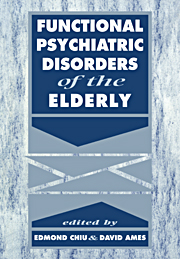Book contents
- Frontmatter
- Contents
- List of contributors
- Preface
- Introduction – A personal note
- Acknowledgement
- Part 1 Classification
- Part 2 General epidemiology
- Part 3 Neuroses
- Part 4 Affective disorders
- Part 5 Psychosexual disorders
- Part 6 Substance use and abuse
- Part 7 Schizophrenia and related psychoses
- Part 8 Psychological, biological and medical issues
- Part 9 Treatment methods
- 25 Geriatric psychopharmacology
- 26 Electroconvulsive therapy in later life
- 27 Family therapy
- 28 Group therapy in the elderly
- 29 Integrated psychotherapy of the elderly
- 30 Management of the treatment team in a multidisciplinary framework
- 31 Occupational therapy
- 32 Nursing management
- 33 Social work and the psychiatry of late life
- 34 Music therapy
- 35 Physiotherapy
- Part 10 Conclusion
- Index
32 - Nursing management
from Part 9 - Treatment methods
Published online by Cambridge University Press: 13 November 2009
- Frontmatter
- Contents
- List of contributors
- Preface
- Introduction – A personal note
- Acknowledgement
- Part 1 Classification
- Part 2 General epidemiology
- Part 3 Neuroses
- Part 4 Affective disorders
- Part 5 Psychosexual disorders
- Part 6 Substance use and abuse
- Part 7 Schizophrenia and related psychoses
- Part 8 Psychological, biological and medical issues
- Part 9 Treatment methods
- 25 Geriatric psychopharmacology
- 26 Electroconvulsive therapy in later life
- 27 Family therapy
- 28 Group therapy in the elderly
- 29 Integrated psychotherapy of the elderly
- 30 Management of the treatment team in a multidisciplinary framework
- 31 Occupational therapy
- 32 Nursing management
- 33 Social work and the psychiatry of late life
- 34 Music therapy
- 35 Physiotherapy
- Part 10 Conclusion
- Index
Summary
‘The first requirement in a hospital is that it should do the sick no harm.’
Florence Nightingale (Quoted by Barritt, 1935)This chapter outlines nursing principles and detailed procedures adopted in the care of elderly patients with a functional psychiatric illness and deals in turn with depression, anxiety neurosis and paranoid states.
Introduction
It is strongly felt that ‘unless nurses have knowledge of the elderly's unique and specialized needs’ acutely ill elderly people will not receive the care they need and deserve, with the result being a potential difference between continued life and death.
Many studies have raised broad issues about the nursing care of the elderly who are acutely or chronically ill, the preparation of nurses to care for the hospitalized elderly, their attitudes and understanding towards the care delivered and the specific needs required. Nurses must be prepared to examine alternative methods and models of caring and practice, and recognize that the elderly comprise a vulnerable and high risk population, very often open to abuse. It is essential to have an understanding of life experiences, loss, dependency, grief, and how many features of a psychiatric illness in the elderly can be masked by an underlying physical illness and that physical illness can be a contributing factor of a psychiatric disorder in the elderly.
Historically, nurses who have chosen to work in old age psychiatry have been viewed as the ‘poor relations’ of the nursing profession. It is only now that nurses specialising in this area are being recognized for their skills and contribution.
- Type
- Chapter
- Information
- Functional Psychiatric Disorders of the Elderly , pp. 544 - 560Publisher: Cambridge University PressPrint publication year: 1994



